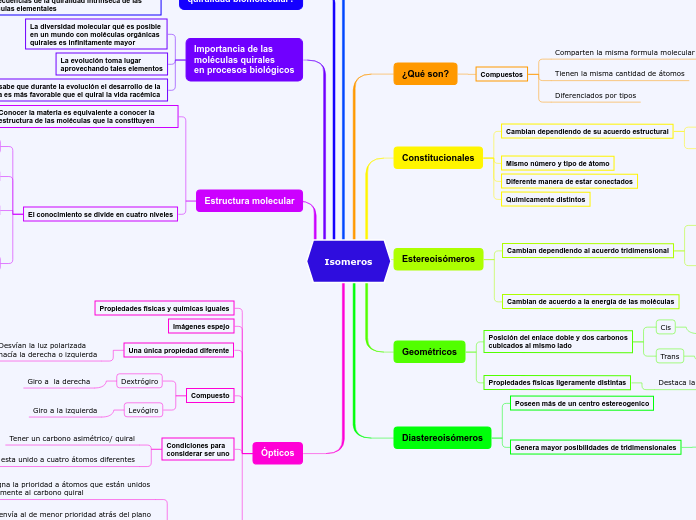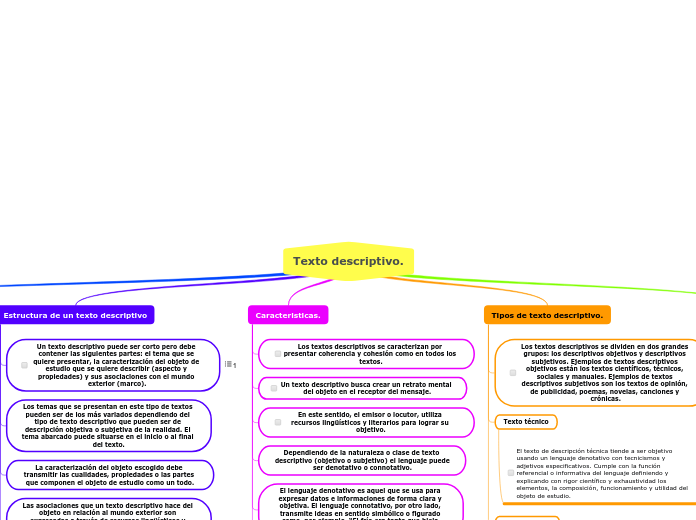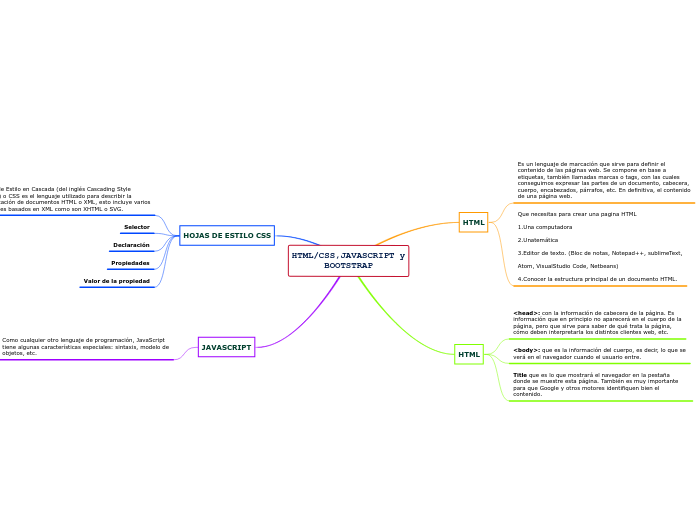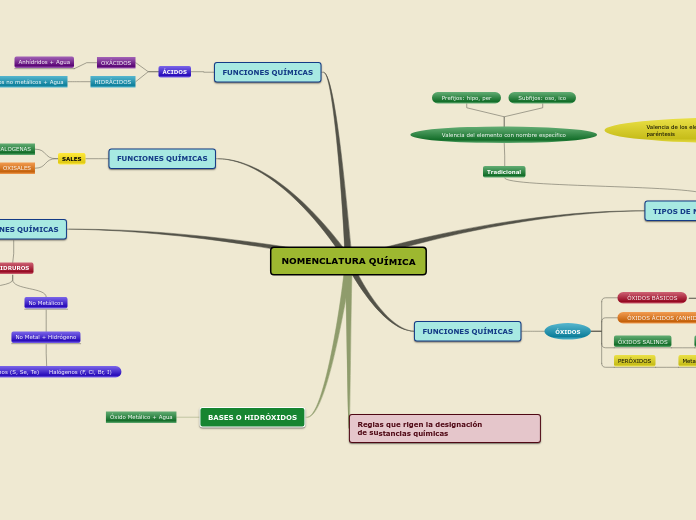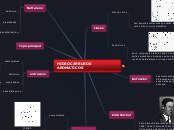Isomeros
The part of speech is a category to which a word is assigned according to its syntactic functions. In English the main parts of speech are noun, pronoun, adjective, determiner, verb, adverb, preposition, conjunction, and interjection.
Ópticos
A conjunction is a word like 'if' 'but' or 'and' which is used to connect sentences or clauses together.
Nomenclatura
Si el giro va en contra de las
manecillas se dice que es S
Si el giro va a favor de las
manecillas del reloj es R
Se observa el giro de mayor a menor prioridad
Se envía al de menor prioridad atrás del plano
Se asigna la prioridad a átomos que están unidos directamente al carbono quiral
Condiciones para
considerar ser uno
Fácilmente esta unido a cuatro átomos diferentes
Tener un carbono asimétrico/ quiral
Compuesto
Levógiro
Giro a la izquierda
Dextrógiro
Giro a la derecha
Una única propiedad diferente
Desvían la luz polarizada
hacía la derecha o izquierda
Subordinating conjunctions are conjunctions that are used at the beginning of subordinate clauses. Some examples of these conjunctions are: although, after, before, because, how, if, once, since, so that, until, unless, when etc.
Propiedades físicas y químicas iguales
Coordinating conjunctions always connect phrases, words, and clauses. They are: for, and, nor, but, or, yet, so.
Estructura molecular
A preposition is one of the most exciting parts of grammar. A preposition is used to describe the location of something in relation to something else.
El conocimiento se divide en cuatro niveles
Compound preposition consists of two or more words.
Conformación molecular
Se origina mediante giros
alrededor de enlaces sencillos
Determinada por la orientación
de los átomos en dicha molécula
Configuración
Pese a que múltiples moléculas contaban con la misma composición y conectividad de sus átomos estas eran distintas
Conectividad
Describe la manera en que
se unen dos átomos entre sí
Composición
Especifica el tipo y número
de átomos presentes en la molécula
Conocer la materia es equivalente a conocer la estructura de las moléculas que la constituyen
When a preposition consists of one word it is called single or simple preposition.
Importancia de las
moléculas quirales
en procesos biológicos
An interjection is used to express emotion in a sentence.
Think of other interjections!
Se sabe que durante la evolución el desarrollo de la vida es más favorable que el quiral la vida racémica
La evolución toma lugar
aprovechando tales elementos
La diversidad molecular qué es posible
en un mundo con moléculas orgánicas
quirales es infinitamente mayor
¿Cómo se originó la
predominancia de la
quiralidad biomolecular?
An adverb is used to describe a verb, but it can also describe an adjective or another adverb.
Adverbs normally help paint a fuller picture by describing how something happens.
Actualmente se considera factible que la predominancia de la quiralidad de las moléculas biológicas esenciales (proteínas, aminoácidos, azúcares, nucleótidos, ácidos nucleicos, etc) son consecuencias de la quiralidad intrínseca de las partículas elementales
Quiralidad
A numeral is a word or phrase that describes a numerical quantity.
Some theories of grammar use the word 'numeral' to refer to cardinal numbers that act as a determiner to specify the quantity of a noun, for example the 'two' in 'two hats'.
Reflejo de la asimetría intrínseca de la materia
Característica fundamental
de los sistemas biológicos
Diastereoisómeros
An article is a word used to modify a noun, which is a person, place, object, or idea. Technically, an article is an adjective, which is any word that modifies a noun.
Genera mayor posibilidades de tridimensionales
Indefinite articles are the words 'a' and 'an.' Each of these articles is used to refer to a noun, but the noun being referred to is not a specific person, place, object, or idea. It can be any noun from a group of nouns.
Ej.
Imágenes espejo
No superponibles
Poseen más de un centro estereogenico
It refers directly to a specific noun or groups of nouns.
Geométricos
A pronoun is a word that can be used in place of a noun, typically after the noun itself has already been stated.
Propiedades físicas ligeramente distintas
Possessive pronouns are used to show possession. The possessive pronouns are mine, yours, his, hers, ours, and theirs.
Destaca la solubilidad
Posición del enlace doble y dos carbonos
cubicados al mismo lado
The personal pronouns are I, you, he, she, it, we, they. More often than not (but certainly not always), they replace nouns representing people.
Trans
Opuesto a los lados
Cis
Del mismo lado
Estereoisómeros
An adjective is a word that's used to describe a specific noun and to provide more detail to the listener.
Cambian de acuerdo a la energía de las moléculas
Cambian dependiendo al acuerdo tridimensional
Expresses a comparison between two entities or groups of entities in quality or degree.
Configuracionales
Se encuentran bien definidos
No se convierten de uno a otro
Conformacionales /
Constitucionales
Cambio en las posiciones
Constitucionales
A noun is defined as a person, place, thing or idea. Proper nouns always begin with a capital letter. Common nouns, which are general words, such as 'cars,' are not capitalized.
Químicamente distintos
Compound nouns are words where two nouns have been stuck together to make a new noun. Compound nouns should be written as one word, without a hyphen.
Diferente manera de estar conectados
A noun which refers to a group of things/people.
Mismo número y tipo de átomo
Countable nouns are nouns that can be counted, even if the number might be extraordinarily high.
Uncountable nouns are nouns that come in a state or quantity which is impossible to count; liquids are uncountable, as are things which act
like liquids.
Cambian dependiendo de su acuerdo estructural
Proper nouns are the names of specific people or places. They should always begin with a capital letter.
Cadenas
Grupos funcionales
¿Qué son?
A verb is an action word or 'doing' word that signifies movement in some way.
Compuestos
A verb with its own meaning: a verb that is not an auxiliary verb.
Diferenciados por tipos
Tienen la misma cantidad de átomos
Comparten la misma formula molecular
